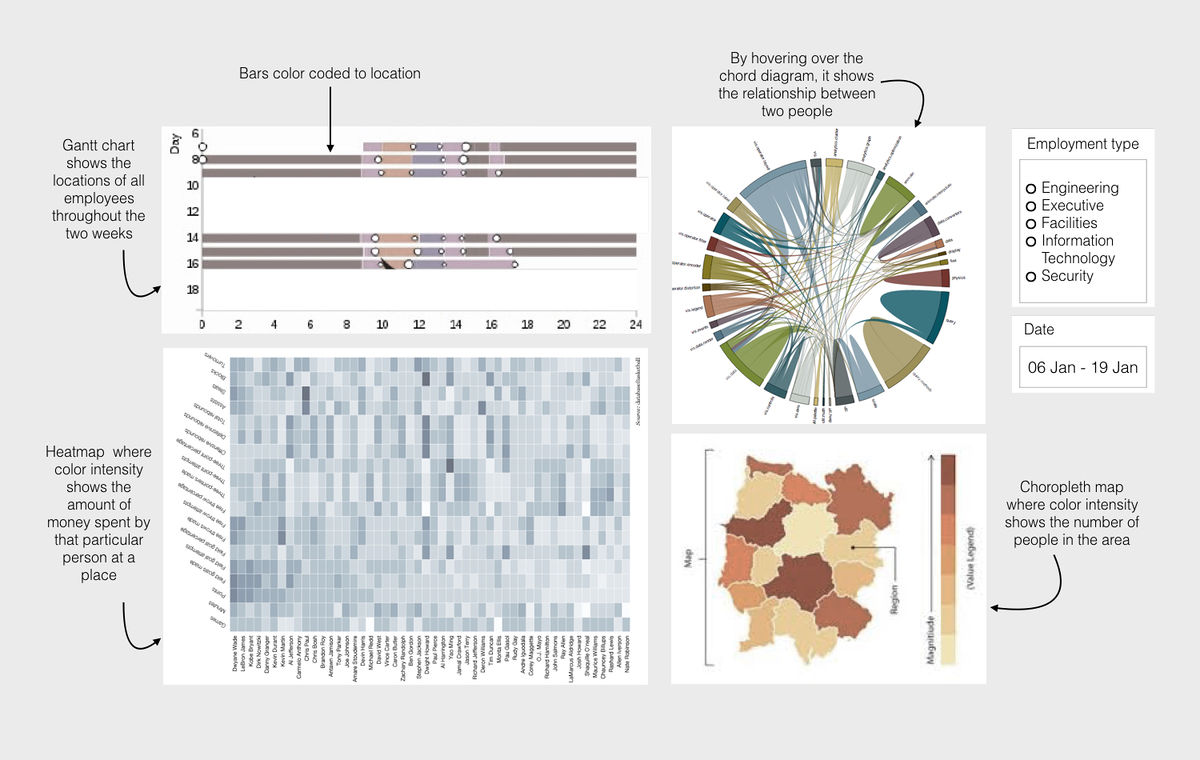GAStech Jr. Crimebusters
- Joanne Ong Shi Ying
- Rachel Tay
GAStech is a Tethys-based company that operates in the natural gas production site in the island country of Kronos for at least the past 20 years. In light of their success, GAStech held a celebration for their newfound wealth in January 2014. During which, found that several of their employees had just disappeared.
The scenario depicted has been derived from a 2014 VAST Challenge, a competition held annually in hopes of advancing the field of visual analytics. This project will focus on the mini challenge 2, which involves geospatial, temporal, and transaction data analysis. Even though the datasets provided are fictitious and found to be lacking in areas in terms of missing values, precision limitations and ambiguities, this level of quality is likely a common and prominent occurrence across most datasets found in real life. Nonetheless, when equipped with the appropriate tools and visualizations, critical information can be identified quickly and accurately, allowing for precise judgments and decisions by law enforcement.
In this case, the project ultimately aims to shed some light onto the people and the locations that the law enforcement should investigate by analysing the movement and tracking data provided, thereby contributing to the investigation towards finding the missing staff members.
Through implementation of the appropriate visual analytics systems, GAStech would be empowered with the following competencies:
- Visualization of all the recorded movements of GAStech employees across the Kronos Island over the 2 weeks.
- Identify unusual patterns of behaviors of the GAStech employees. Out of which, prioritize the patterns that might be related to the missing staff members.
GAStech provided company cars to its employees for both personal and business purposes. However, unknown to the employees, trackers were installed into the company vehicles and these devices periodically recorded the vehicles’ geospatial positions when they were moving. Therefore, the provided dataset includes 2 weeks of GPS tracking ata for several company vehicles assigned to employees, credit and loyalty card transactional information of employees an ESRI shapefiles of Abila and country, Kronos.
The dataset can be found in the link provided below:
http://vacommunity.org/VAST+Challenge+2014%3A+Mini-Challenge+2http://vacommunity.org/VAST+Challenge+2014%3A+Mini-Challenge+2
| Related Works | Learnings |
|---|---|
| “Constructing Semantic Interpretation of Routine and Anomalous Mobility Behaviors from Big Data” | This literature provides a scalable visual analytics approach to the same problem. Albeit mostly sophisticated, the models were chosen to bring forth certain concepts and ideas that could be adopted and adapted into a format more suitable. Take the idea of spatio-temporal aggregation for example. With this, the hourly visit counts for particular locations within the stipulated time cycles were obtained. This information could potentially be meaningful to the project. |
| “Making Sense of Daily Life Data: From Commonalities To Anomalies”
Source (http://people.cs.vt.edu/~wji/VAST_2014_MC2_VT_Wang.pdf) |
This literature offers a familiar implementation through the use of Tableau software and comfort in the fact that fancy softwares are not required when identifying trends and anomalies effectively. Their common sense making loop is commendable as it allowed a systematic approach to solving the problems of the case. |
| “MovementFinder: A Multi-filter Visual Analytics Design for Movement”
Source (https://pdfs.semanticscholar.org/de8e/bdaa2d24aa67fc3f722f48c5567a4c33bf0b.pdf) |
The main learning from this literature is their comprehensive and organised interface; each chart in their dashboard had a different and well-defined purpose. This technique will be taken into account when developing the storyboard. |
Being novices in this field, technical challenges are to be expected in the course of producing the final deliverables. The following lists the key challenges that will be expected and the consequent action plan that was drawn out in hopes of mitigating the problems.
| Key Technical Challenges | Action Plan |
|---|---|
| Data processing and cleaning into a format appropriate for the stipulated visualizations | It is imperative to ensure that a thorough understanding of both the dataset of interest and the requirements of the visualizations have been grasped. This would allow the identification of the accurate links between the data and hence, the synthetic data required instead of delving into processing the data straightaway aimlessly. |
| Designing the visualization due to lack of knowledge in Javascript programming and D3 libraries. | In hopes to alleviate the load, familiarising with the tools is essential. This can be done by referencing guides and examples available through the D3 API references and gallery links provided, going through tutorials at Codeacademy for Javascript language and hands-on experiences by attending the scheduled D3 Workshop in Week 7. The option of consultation is always available too with Prof Kam or Prof Prakash if necessary. |
The timeline of the various project milestones are simplified into a table format shown below, where it is clearly stated the expected start and end times.
- Chen, S., Wang, Z., Liu, Z., Wang, Z., Wang, C., Miao, Z., & Yuan, X. (2014). MovementFinder: A multi-filter visual analytics design for movement data investigation. 2014 IEEE Conference on Visual Analytics Science and Technology (VAST). doi:10.1109/vast.2014.7042558
- Fuchs, G., Stange, H., Hecker, D., Andrienko, N., & Andrienko, G. (2015). Constructing semantic interpretation of routine and anomalous mobility behaviors from big data. SIGSPATIAL Special, 7(1), 27-34. doi:10.1145/2782759.2782765
- Choo, J., Han, Y., Hu, M., Kim, H., Nugent, J., Poggi, F., . . . Stasko, J. (2014). Exploring anomalies in GAStech: VAST 2014 Mini Challenge 1 and 2. 2014 IEEE Conference on Visual Analytics Science and Technology (VAST). doi:10.1109/vast.2014.7042559
- Wang, J., Mi, P., & North, C. (2014). Making sense of daily life data: From commonalities to anomalies: VAST 2014 Mini Challenge #2. 2014 IEEE Conference on Visual Analytics Science and Technology (VAST). doi:10.1109/vast.2014.7042568


